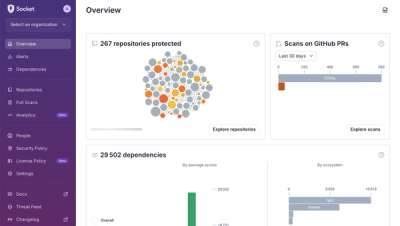
Product
A New Overview in our Dashboard
We redesigned Socket's first logged-in page to display rich and insightful visualizations about your repositories protected against supply chain threats.
node-fetch-native
Advanced tools
A redistribution of node-fetch v3 (+ more!) for better backward and forward compatibility.
Why this package?
require('node-fetch') with the latest version. This stopped popular libraries from upgrading and dependency conflicts between node-fetch@2 and node-fetch@3.fetch is being supported. We are prepared for native fetch support using this package yet keep supporting older Node versions.Features:
✅ Prefer to native globals when available (See Node.js experimental fetch).
✅ Compact build and less install size with zero dependencies vs
✅ Support both CommonJS (require) and ESM (import) usage
✅ Use native version if imported without node condition using conditional exports with zero bundle overhead
✅ Polyfill support for Node.js
✅ Compact and simple proxy supporting both Node.js versions without native fetch using HTTP Agent and versions with native fetch using Undici Proxy Agent
Install node-fetch-native dependency:
# npm
npm i node-fetch-native
# yarn
yarn add node-fetch-native
# pnpm
pnpm i node-fetch-native
You can now either import or require the dependency:
// ESM
import fetch from "node-fetch-native";
// CommonJS
const fetch = require("node-fetch-native");
More named exports:
// ESM
import {
fetch,
Blob,
FormData,
Headers,
Request,
Response,
AbortController,
} from "node-fetch-native";
// CommonJS
const {
fetch,
Blob,
FormData,
Headers,
Request,
Response,
AbortController,
} = require("node-fetch-native");
Sometimes you want to explicitly use none native (node-fetch) implementation of fetch in case of issues with the native/polyfill version of globalThis.fetch with Node.js or runtime environment.
You have two ways to do this:
FORCE_NODE_FETCH environment variable before starting the application.node-fetch-native/nodeOnce the node-fetch-native/node module is loaded, it pushes a log warning if the current runtime differs from the Node.js. Set the DISABLE_NODE_FETCH_NATIVE_WARN environment variable to turn this check off.
Using the polyfill method, we can ensure global fetch is available in the environment and all files. Natives are always preferred.
Note: I don't recommend this if you are authoring a library! Please prefer the explicit methods.
// ESM
import "node-fetch-native/polyfill";
// CJS
require("node-fetch-native/polyfill");
// You can now use fetch() without any import!
Node.js has no built-in support for HTTP Proxies for fetch (see nodejs/undici#1650 and nodejs/node#8381)
This package bundles a compact and simple proxy-supported solution for both Node.js versions without native fetch using HTTP Agent and versions with native fetch using Undici Proxy Agent.
By default, https_proxy, http_proxy, HTTPS_PROXY, and HTTP_PROXY environment variables will be checked and used (in order) for the proxy and if not any of them are set, the proxy will be disabled. You can override it using the url option passed to createFetch and createProxy utils.
By default, no_proxy and NO_PROXY environment variables will be checked and used for the (comma-separated) list of hosts to ignore the proxy for. You can override it using the noProxy option passed to createFetch and createProxy utils. The entries starting with a dot will be used to check the domain and also any subdomain.
[!NOTE] Using export conditions, this utility adds proxy support for Node.js and for other runtimes, it will simply return native fetch.
fetch with proxy supportYou can simply import { fetch } from node-fetch-native/proxy with a preconfigured fetch function that has proxy support.
import { fetch } from "node-fetch-native/proxy";
console.log(await fetch("https://icanhazip.com").then((r) => r.text()));
createFetch utilityYou can use the createFetch utility to instantiate a fetch instance with custom proxy options.
import { createFetch } from "node-fetch-native/proxy";
const fetch = createFetch({ url: "http://localhost:9080" });
console.log(await fetch("https://icanhazip.com").then((r) => r.text()));
createProxy utilitycreateProxy returns an object with agent and dispatcher keys that can be passed as fetch options.
import { fetch } from "node-fetch-native";
import { createProxy } from "node-fetch-native/proxy";
const proxy = createProxy();
// const proxy = createProxy({ url: "http://localhost:8080" });
console.log(
await fetch("https://icanhazip.com", { ...proxy }).then((r) => r.text()),
);
node-fetchUsing this method, you can ensure all project dependencies and usages of node-fetch can benefit from improved node-fetch-native and won't conflict between node-fetch@2 and node-fetch@3.
Using npm overrides:
// package.json
{
"overrides": {
"node-fetch": "npm:node-fetch-native@latest",
},
}
Using yarn selective dependency resolutions:
// package.json
{
"resolutions": {
"node-fetch": "npm:node-fetch-native@latest",
},
}
Using pnpm.overrides:
// package.json
{
"pnpm": {
"overrides": {
"node-fetch": "npm:node-fetch-native@latest",
},
},
}
Made with 💛 Published under the MIT license.
FAQs
better fetch for Node.js. Works on any JavaScript runtime!
The npm package node-fetch-native receives a total of 3,825,605 weekly downloads. As such, node-fetch-native popularity was classified as popular.
We found that node-fetch-native demonstrated a healthy version release cadence and project activity because the last version was released less than a year ago. It has 1 open source maintainer collaborating on the project.
Did you know?

Socket for GitHub automatically highlights issues in each pull request and monitors the health of all your open source dependencies. Discover the contents of your packages and block harmful activity before you install or update your dependencies.

Product
We redesigned Socket's first logged-in page to display rich and insightful visualizations about your repositories protected against supply chain threats.

Product
Automatically fix and test dependency updates with socket fix—a new CLI tool that turns CVE alerts into safe, automated upgrades.

Security News
CISA denies CVE funding issues amid backlash over a new CVE foundation formed by board members, raising concerns about transparency and program governance.